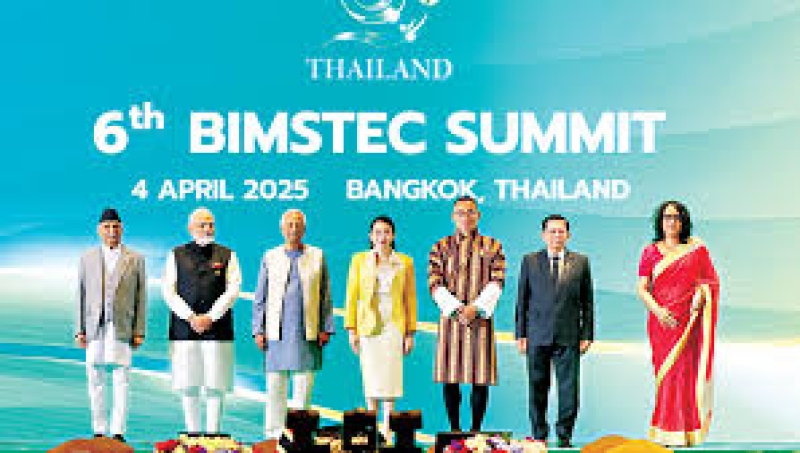- India Sees 9% Drop in Foreign Tourists as Bangladesh Visits Plunge |
- Dhaka Urges Restraint in Pakistan-Afghan War |
- Guterres Urges Action on Safe Migration Pact |
- OpenAI Raises $110B in Amazon-Led Funding |
- Puppet show enchants Children as Boi Mela comes alive on day 2 |
BIMSTEC Reaffirms Role in Regional Security and Dev

Amid an increasingly complex global landscape, the 6th BIMSTEC Summit has reaffirmed the regional grouping’s vital role in fostering cooperation to address shared security concerns and sustainable development challenges. According to the BIMSTEC Secretariat, the summit highlighted the ongoing institutional reforms within the organization, positioning BIMSTEC as a dynamic force for peace, prosperity, and resilience in the Bay of Bengal region.
Leaders at the summit underscored the need to bolster intra-regional trade, investment, connectivity, and security, while calling for enhanced collaboration in areas such as tourism, cultural exchanges, climate action, renewable energy, sustainable agriculture, food security, and disaster management.
The Secretariat described the summit as a turning point for BIMSTEC, providing renewed momentum for the vision of a "prosperous, resilient, and open BIMSTEC." The leaders also identified key areas of priority for regional cooperation, with specific proposals and initiatives presented for future action.
The 6th BIMSTEC Summit, held on Friday in Bangkok, was preceded by the 25th BIMSTEC Senior Officials’ Meeting on April 2 and the 20th BIMSTEC Ministerial Meeting on April 3. The summit was attended by the Heads of State and Government of the seven BIMSTEC member countries, including Bangladesh, Bhutan, India, Myanmar, Nepal, Sri Lanka, and Thailand.
Key Outcomes of the 6th BIMSTEC Summit:
BIMSTEC Bangkok Vision 2030: The first-ever Vision Document, which outlines a practical roadmap for future cooperation among member states to achieve the goals of a "Prosperous, Resilient, and Open BIMSTEC."
Maritime Transport Cooperation Agreement: A significant step towards enhancing regional partnerships for improved maritime connectivity, boosting trade and travel among member states.
MoU with IORA: An agreement formalizing future collaboration with the Indian Ocean Rim Association (IORA) on shared interests.
MoU with UNODC: A partnership formalized with the United Nations Office on Drugs and Crime to address mutual priorities.
Rules of Procedure Adoption: The new rules, along with the BIMSTEC Charter, establish a stronger institutional framework for regional cooperation.
Eminent Persons Group Report: Adoption of a report with recommendations to reform and revitalize BIMSTEC.
BIMSTEC Leaders’ Joint Statement: A statement expressing solidarity with Myanmar and Thailand following the March 2025 earthquake, reaffirming the group’s commitment to improving disaster management and response mechanisms.
The leaders also expressed condolences for the victims of the March 2025 earthquake in Myanmar and Thailand, and reaffirmed their commitment to enhancing regional cooperation on disaster management.
BIMSTEC Secretary General Indra Mani Pandey provided an update on progress since the 5th Summit in 2022 and sought guidance from the leaders on advancing the regional agenda. At the conclusion of the summit, Bangladesh assumed the chairmanship of BIMSTEC, with Chief Adviser Prof Muhammad Yunus reiterating the country’s commitment to strengthening regional cooperation.
BIMSTEC comprises seven countries: Bangladesh, Bhutan, India, Myanmar, Nepal, Sri Lanka, and Thailand, all situated around the Bay of Bengal.
This revision refines the flow of information, enhances readability, and improves clarity while keeping the important points intact.

